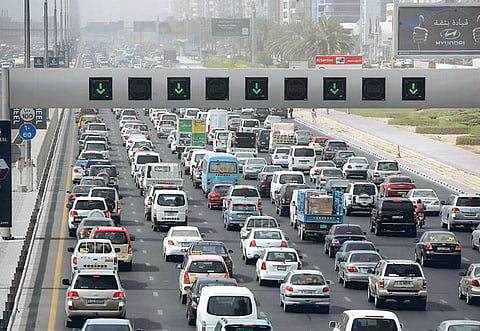Car-free Day gets under way in Dubai
Dubai Municipality asks employees to leave their vehicles at home hoping that the move will push other institutions to take the green step

Dubai: Did you use your car today to get to work? If not, you joined the 1,500 Dubai Municipality staff that were asked to leave their cars at home and make their way to the office using public transport.
Almost 1,500 Dubai Municipality employees have left their wheels behind and opted for public transport to get to work on Wednesday as they celebrated Car-free Day.
The Dubai Municipality hopes that the initiative will encourage other institutions, governments and businesses to do the same.
This action aims to relieve the atmosphere of some of the toxic gases emitted every day by more than one million cars on Dubai's roads.
The Municipality's Car Free Day has been called a "huge success" by Director General Hussain Lootah. "I hope that the experience today makes more people want to use public transport on a regular basis," Lootah said.
Though most of the reponse to Wednesday's morning commute is positive, many employees are interested in seeing if the return trip is as pleasant before making up their minds.
Traffic emissions pose a major threat to the environment and clean air. Petrol and diesel-engine vehicles emit a variety of pollutants, principally carbon monoxide (CO), nitrogen oxides (NOx), volatile organic compounds (VOCs) and particulates (PM10), whose impact on urban air quality is negative and alarming.
The photochemical reactions resulting from the action of sunlight on nitrogen dioxide (NO2) and VOCs emitted by vehicles leads to the formation of a secondary long-range pollutant whose impacts can be felt far from the original place of emission.
Traffic pollution problems are worsening worldwide. According to Municipality statistics, the transport sector contributes 42 per cent of gas pollution in Dubai. In 2009, more than 23,000 tonnes of toxic gases were emitted by 1,021,880 cars in Dubai.
New tradition
Hussain Nasser Lootah, Director-General of Dubai Municipality, said February 17 would mark the beginning of Car-free Day in the emirate from 2010 — a day that will be observed in the coming years. Lootah said he would use the metro to travel to work today.
The Car-free Day concept first emerged in 1970 in the United States during the oil crisis. Many European cities started implementing similar days in the 1990s. Currently, more than 40 countries observe this day.
The car park will be closed today at the Municipality and visitors should also plan to use public transport.
Each vehicle releases 110-250 grammes per kilometre of carbon dioxide. According to municipality statistics, Dubai has 1,021,880 vehicles on its roads producing over 23,3 million kilogrammes of CO2 each day.
Cars running on petrol are responsible for around 82 per cent of the fumes. They are followed by cars running on diesel, with more than seven per cent of pollution. Trucks, buses, heavy vehicles and motorbikes make up the remaining 11 per cent.
According to Dubai Municipality there are several ways in which motorists can reduce their vehicle emissions. Vehicles should be properly maintained and drivers should avoid accelerating and exceeding speed limits as this can increase pollutant emissions.
It was also noted that motorists should not overload their cars or trucks as added weight increases fuel consumption and emissions.
- 23,343,762: kilograms of carbon dioxide produced every day
- 1,021,880: the estimated number of cars in Dubai
- 23,000: tonnes of toxic gases emitted by vehicles in 2009
With input from Mohammed N Al Khan, Multimedia Reporter



